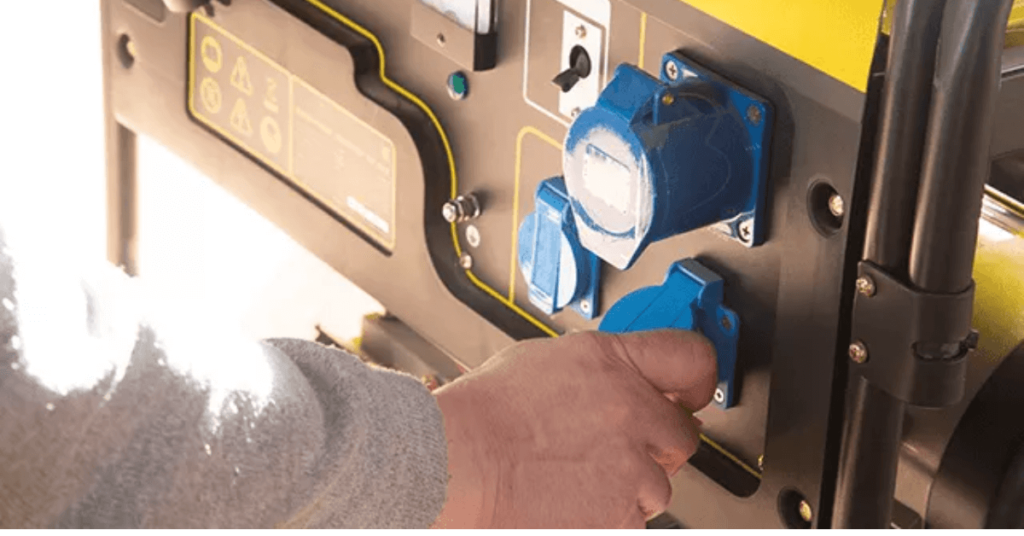Electric generators play a critical role in providing power supply during times of power outages and emergency situations. What Is The Role Of A Fuel Shut-Off Valve In Electric Generators? They serve as a backup power source for homes, businesses, hospitals, and other facilities, ensuring that essential systems and appliances remain operational.

To ensure that electric generators function properly and safely, it is important to understand the various components that make up the generator. This includes the fuel shut-off valve, which plays a crucial role in controlling the flow of fuel to the engine.
The fuel shut-off valve is designed to stop the fuel supply to the engine in the event of an emergency or when the generator is turned off. This prevents the engine from running without fuel, which can lead to safety hazards and reduce fuel efficiency.
By understanding the role of the fuel shut-off valve and other components of an electric generator, individuals can ensure that their generators provide reliable backup power in emergency situations and remain safe and efficient for years to come. Regular maintenance and proper installation of the fuel shut-off valve can help to extend the lifespan of the generator and reduce the need for costly repairs, ultimately saving time and money.
How Electric Generators Work
Electric generators are machines that convert mechanical energy into electrical energy. Mechanical energy is typically obtained by burning a fuel source, such as gasoline, diesel, or propane, in an engine. The engine drives a rotor that is surrounded by a magnetic field. As the rotor spins, it creates a changing magnetic field that induces a flow of electrons in a coil of wire, located in the stator of the generator.
This flow of electrons creates an electrical current that is typically in the form of an alternating current (AC). AC power is used in most homes and businesses and is more efficient for long-distance power transmission than direct current (DC) power.
The amount of electrical power that an electric generator can produce depends on several factors, including the size and strength of the rotor and stator, the speed at which the rotor spins, and the amount of fuel that is burned in the engine. Generators come in a variety of sizes, from small portable units that can power a few appliances, to large industrial generators that can provide power for entire buildings or facilities.
The Role Of A Fuel Shut-Off Valve
A fuel shut-off valve is an important component of an electric generator that is responsible for controlling the flow of fuel to the engine. It is designed to stop the fuel supply to the engine in the event of an emergency or when the generator is turned off. This prevents the engine from running without fuel and helps to improve safety and fuel efficiency.
There are several types of fuel shut-off valves, including manual, automatic, and solenoid valves. Manual valves require the operator to physically turn a knob or lever to shut off the fuel supply. Automatic valves are designed to shut off the fuel supply when the generator is turned off, while solenoid valves use an electromagnetic field to control the flow of fuel.
Advantages Of A Fuel Shut-Off Valve
One of the main advantages of a fuel shut-off valve is increased safety. In the event of an emergency, such as a fire or gas leak, the valve can quickly shut off the fuel supply to the engine, preventing the generator from causing further damage. Additionally, a fuel shut-off valve can improve fuel efficiency by reducing fuel consumption when the generator is not in use.
Another advantage of a fuel shut-off valve is reduced maintenance costs. By preventing the engine from running without fuel, the valve can help to extend the lifespan of the generator and reduce the need for costly repairs. This can save both time and money in the long run.
Maintenance Of A Fuel Shut-Off Valve
Regular maintenance of the fuel shut-off valve is essential to ensure that it functions properly when it is needed most. This includes cleaning and lubricating the valve, inspecting it for any signs of wear or damage, and testing it regularly to ensure that it shuts off the fuel supply to the engine as intended.
Signs of a faulty fuel shut-off valve may include leaks, difficulty turning the valve, or the engine running without fuel. If any of these signs are detected, it is important to have the valve inspected and repaired by a qualified technician as soon as possible.
Installation Of A Fuel Shut-Off Valve
Installing a fuel shut-off valve can be a simple and straightforward process. However, it is important to follow the manufacturer’s instructions carefully and to use the appropriate tools and equipment.
The first step in installing a fuel shut-off valve is to locate the fuel line that runs from the fuel tank to the engine. Once this line has been located, the valve can be installed by cutting the fuel line and attaching the valve in line with the fuel flow. The valve should be securely fastened and tested to ensure that it shuts off the fuel supply to the engine as intended.
Choosing The Right Fuel Shut-Off Valve
When choosing a fuel shut-off valve, there are several factors to consider. These factors include the type of generator, the fuel source, and the environment in which the generator will be used. It is important to choose a valve that is compatible with the generator’s fuel system and that is designed to handle the specific fuel source that will be used.
There are several different types of fuel shut-off valves available, each with its own advantages and disadvantages. For example, a manual valve may be more reliable and durable, but an automatic valve may be easier to use and more convenient.
It is also important to choose a valve that is designed for the environment in which the generator will be used. For example, a valve that is designed for outdoor use may be more durable and resistant to weather and environmental conditions than a valve designed for indoor use.
Fuel Shut-Off Valve And Generator Safety
In addition to providing increased safety in emergency situations, a fuel shut-off valve can also improve overall generator safety. When installed and maintained properly, a fuel shut-off valve can help to prevent fuel leaks, reduce the risk of fires, and minimize the risk of carbon monoxide poisoning.
It is important to take additional safety measures when using a generator with a fuel shut-off valve. This includes ensuring that the generator is located in a well-ventilated area, away from windows and doors, and that all electrical connections are properly grounded.
Benefits Of Using A Generator With A Fuel Shut-Off Valve
There are several benefits to using a generator with a fuel shut-off valve. One of the main benefits is cost savings. By reducing fuel consumption and extending the lifespan of the generator, a fuel shut-off valve can help to save both time and money in the long run.
Another benefit is reduced emissions. By shutting off the fuel supply to the engine when the generator is not in use, a fuel shut-off valve can help to reduce carbon emissions and other harmful pollutants.
A generator with a fuel shut-off valve also provides an important backup power supply in emergency situations. Whether it is a power outage caused by a storm or other natural disaster, or a temporary interruption in the fuel supply, a generator with a fuel shut-off valve can help to ensure that critical systems and appliances remain operational.
Limitations Of A Fuel Shut-Off Valve
While a fuel shut-off valve can provide several benefits, there are also some limitations to consider. For example, if the valve malfunctions or is not properly maintained, it can lead to interruptions in power supply or other problems.
Additionally, a fuel shut-off valve may require additional maintenance compared to a generator without a valve. This can include regular testing and cleaning to ensure that the valve is functioning properly.
Frequently Asked Questions (FAQs): What Is The Role Of A Fuel Shut-Off Valve In Electric Generators
What is a fuel shut-off valve?
A fuel shut-off valve is a component of an electric generator that controls the flow of fuel to the engine. It is designed to shut off the fuel supply to the engine in the event of an emergency or when the generator is turned off.
Why is a fuel shut-off valve important in electric generators?
A fuel shut-off valve is important in electric generators because it helps to improve safety, reduce fuel consumption, and extend the lifespan of the generator.
What are the different types of fuel shut-off valves?
There are several types of fuel shut-off valves, including manual valves, automatic valves, and solenoid valves. Manual valves require the operator to physically turn a knob or lever to shut off the fuel supply. Automatic valves are designed to shut off the fuel supply when the generator is turned off, while solenoid valves use an electromagnetic field to control the flow of fuel.
How do I maintain a fuel shut-off valve in an electric generator?
Regular maintenance of the fuel shut-off valve is essential to ensure that it functions properly when it is needed most. This includes cleaning and lubricating the valve, inspecting it for any signs of wear or damage, and testing it regularly to ensure that it shuts off the fuel supply to the engine as intended.
Can I install a fuel shut-off valve on my own?
While it is possible to install a fuel shut-off valve on your own, it is important to follow the manufacturer’s instructions carefully and to use the appropriate tools and equipment. If you are unsure about how to install a fuel shut-off valve, it is recommended to consult with a qualified technician.
Conclusion
In conclusion, a fuel shut-off valve is an essential component of an electric generator that helps to ensure the safe and efficient operation of the unit. By controlling the flow of fuel to the engine, the valve helps to prevent fuel leaks and reduce the risk of fires or other hazards.
In addition to improving safety, a fuel shut-off valve can also help to improve fuel efficiency and reduce fuel consumption when the generator is not in use. This can lead to significant cost savings over time and can also help to reduce carbon emissions and other harmful pollutants.
To ensure that your generator remains safe and efficient, it is important to choose the right type of fuel shut-off valve for the specific generator and fuel source. It is also crucial to install the valve properly and to maintain it regularly to ensure that it functions as intended.
Regular testing and inspection of the fuel shut-off valve can help to identify any potential issues or malfunctions before they become major problems. By taking these steps, you can help to ensure that your generator provides reliable backup power in emergency situations and remains safe and efficient for years to come.




